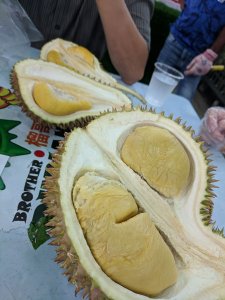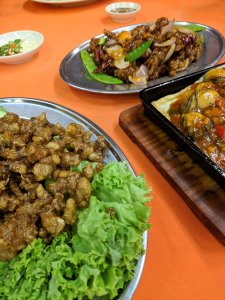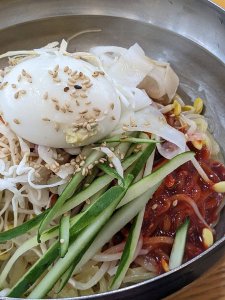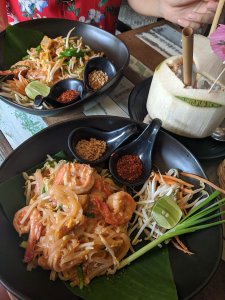
The gastronomic world of Asia is bright and colorful. It is not like European cities. This is a different rhythm of life, worldview, culture, traditions. Residents of this vibrant and often warm part of the world are accustomed to their food and take it for granted. For Europeans, Asian eating habits can be funny or even shocking. The average European stomach, to be honest, is not always ready for that kind of diversity. Eating habits are also unique here. So, let’s figure that out, and ask. No, not from professors, doctors, gurus, but from ordinary travelers. What is the Asian gastronomic world like? Let’s find out from a professional model and gastronomic enthusiast, Hanna Boiko. Due to her work and passion for culinary research, she travels a lot to Asian countries, tasting and cooking. And over there she became a vegetarian.
— How many years have you been traveling, and which Asian countries have you been to?
I’m traveling for about 8 years, and I’ve visited countries like Singapore, Malaysia, Thailand, Hong Kong, Vietnam, Indonesia, Taiwan, India, South Korea, China, and Cambodia.
— What gastronomic features surprised you the most, and in which country was it?

The most exotic thing I’ve ever tried was definitely Durian. It’s a fruit that they call “the king of all fruits”; it has a very pungent smell, but a sweet and creamy taste, though it’s surely not for everyone. The smell can easily put people off trying it. And I also tried crocodile meat. I was expecting something incredible. But it tastes like chicken to me. I didn’t want to try grasshoppers, beetles, or spiders. Although for residents of various Asian countries, this is historically normal, these things are meant for tourists like me.
— Which Asian country’s cuisine do you like best and why? Did individual dishes or the national cuisine as a whole win your heart?
My favorite cuisines so far have to be Thai and Korean. Both are very unique and have a high spice level, but also both incorporate sweet and sour ingredients in their cooking, to make the dishes balanced.
— How do you usually get acquainted with the cuisine of a new country? Do you choose a restaurant, cafe in advance, or go to the local farmers market and try to cook yourself?

Most of the time you have to start with ready-to-eat foods from the supermarket and then move up to cafes and street food. Because you need some time to get used to local ingredients, and your stomach always needs time to adapt, you can’t be too adventurous too soon.
— Was it scary to try unusual dishes?
I’m always eating foods that have been tried by someone else before; it’s almost never a big risk from my side, or even going to cafes takes some research beforehand.
— How do you learn the dishes of a new country? Do you ask locals how they cook it? Are there any communication difficulties? In Asia, English is not spoken everywhere.
You learn everything with Google; we almost never ask locals about the food; it’s rude to do as a foreigner. So it’s best to avoid it, and trust the cooks.
— When did you decide to become a vegetarian and why did it happen?
I’ve been vegetarian for over 5 years; I decided that it’s a good choice for my health and it works for me so far, so I’m happy with the difference it makes.

— Do you think veggie burgers and sausages have a bright future in Asia?
There’s plenty of vegetarian food, including meat substitutes, mostly commercial brands. But also many local eateries in places like Thailand and India make their own vegetarian sausages and cheese. Sometimes it’s even cheaper than the “meat” versions.
— You are a professional model and should think about how you look on the catwalk or in front of a photo lens. Should models adhere to a strict fitness diet or is this a myth, a societal stereotype?
It depends on the person and their genetics. Some people have to go to the gym every day and eat very clean, and others have no problem with eating fast food every other day. But definitely there shouldn’t be too much of either. Drinking lots of water helps immensely.
— What principles of healthy eating are important to you personally? How do you choose what is good for you and what is harmful?
Usually, I look at my body’s reaction, how I feel, and allergic reactions on my skin. If this appears, then it is bad food and should be avoided.

— In your observations, what influences people’s eating preferences more in different Asian countries? Religion, national traditions, or banal habits?
I think the food preferences have to do with the culture a person grows up with. Each country has different ingredients available, and they make the most of it, spice levels included. It’s usually many generations long journey.
— Is there a difference in everyday nutrition and nutrition during long flights? Yes, on the plane, you are fed whatever the airline determines. But are there any taboos or life hacks for you in this mode?
If you want to have more snacks throughout the flights, you should bring your own, but almost always the plane food is good enough. You can’t eat too much when you’re thousands of miles up in the air.
— What kind of breakfast do you consider ideal?
A good breakfast is the one that keeps you energized the first few hours of the day. Some people skip breakfast entirely because they already have enough energy from the moment they wake up or replace it with coffee. For me what works is toasted bread and many variations of toppings.
— In which city or country in the world would you like to stay longer, and what dishes would you enjoy eating there every day?
The best variety of foods award from me probably goes to Thailand. It’s filling, it’s spicy, and balanced, so every meal feels like a nice complete story.
Journalist: Nataliya Nagorna
Photos kindly provided by Hanna Boiko

